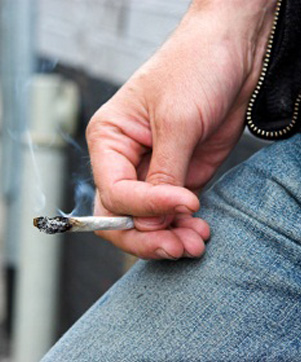Images of stoners staring off into space, reacting with sudden or unexpected moves to threats only they can see are a mainstay of movies and television plots where long-term drug use plays at least a peripheral part of the overall plot.
In fact, audiences are so used to associating complete lack of motivation with chronic pot users that it might come as a surprise that this area hasn’t been studied, until now.
A new study by scientists at Imperial College London, UCL and Kings College London did just that, finding that long-term marijuana users tend to produce less dopamine, a brain chemical linked to motivation. The study was published in the journal Biological Psychiatry.
Results of the study showed that dopamine levels in the striatum (a part of the brain) were lower in people who smoke more marijuana and those who began regular marijuana use at a younger age.
The study authors suggest that this lower level of dopamine could explain some marijuana users’ utter lack of motivation or interest in pursuing normal activities.
The mechanics of the study involved using PET brain imaging to peer into the production of dopamine in the striatum of two age and sex-matched groups of 19 each. The only difference between the groups was that one group consisted of regular cannabis users and the other was non-users.
Among the cannabis user-group, all had experienced some sort of psychotic symptoms while smoking the drug. These included feeling strange sensations or having bizarre thoughts, such as being threatened by an unknown force.
Although researchers expected to see higher dopamine production in the regular cannabis user group, since said increased dopamine production has been linked with psychosis, they actually found the opposite effect.
Study participants in the cannabis-user group initiated their drug experience between the ages of 12 and 18. Researchers found a trend for lower dopamine levels in those who began marijuana use earlier, and in those who smoked more of the drug, leading to their suggestion that cannabis use may be the reason why dopamine levels are different.
Who had the lowest dopamine levels? Researchers said it was in users who meet diagnostic criteria for cannabis abuse or dependence and speculate that this measure could provide a marker of addiction severity.
Dr. Michael Bloomfield, from the Institute of Clinical Sciences at Imperial, who led the study, said that the findings weren’t what researchers expected, “but they tie in with previous research on addiction, which has found that substance abusers – people who are dependent on cocaine or amphetamine, for example – have altered dopamine systems.”
Bloomfield said that although they only looked at cannabis users who had psychotic-like experiences during drug use, they believe the findings would apply to cannabis users in general, “since we didn’t see a stronger effect in the subjects who have more psychotic-like symptoms.” He added that this needs to be tested.
Study takeaway: Marijuana users’ lack of motivation, or “amotivational syndrome,” could be explained by lowered dopamine levels.








